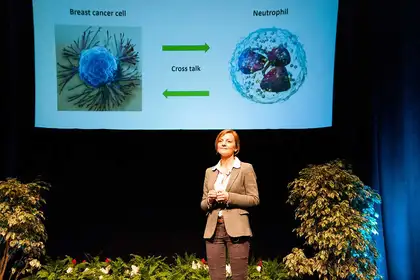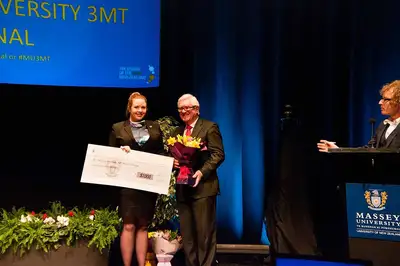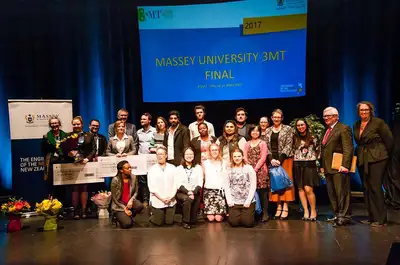
PhD breast cancer researcher Sherina Holland, who won the Massey 3MT finals for 2017 (photo/Alexis Boniface).
Research on the “cross-talk” between breast cancer cells and immune cells that could lead to new understandings of and targeted treatment for the disease has won PhD candidate Sherina Holland the top prize in the Massey finals of the 2017 Three-Minute Thesis (3MT).
Ms Holland, based in the School of Food and Nutrition at the Auckland campus, won $5000, beating 10 other doctoral contestants in the ‘elevator pitch’ competition for academics.
Finalists wowed the four judges and the audience with a wide range of research topics in master’s and doctoral categories. MC, media personality and comedian Te Radar shared his enthusiasm for the event, telling the audience he felt 3MT finalists could be the basis of an exciting new television series on innovative research projects in New Zealand universities.
Doctoral topics included challenging economic structures to end modern slavery in India’s brick kilns; how to design user-friendly disaster apps; and getting tomato sauce (and other soft materials) to flow better to enhancing access to online banking for the elderly, the history of dressmaking and exploring new cancer treatments.
In the master’s section, researchers presented on the science of improving leather quality; probiotics in sourdough bread; better packaging for the kiwi berry to improve exports, and the importance of designing and developing public spaces for better mental health to reduce stress, fatigue and isolation.
PhD researcher Andrew Drain, also from the Auckland campus, was Runner-up ($2000) with his presentation on the role of co-design in helping people with disabilities in rural Cambodia. Mr Drain, from the School of Engineering and Advanced Technology, gave an emotionally compelling presentation of his research to address the needs of thousands of Cambodians disabled by injuries from landmine explosions.
The People’s Choice PhD ($1000) winner went to Rebecca Lucas-Roxburgh, Institute of Veterinary, Animal and Biomedical Sciences, for her research on sex, vaccines and cancer.

Master's category winner for 3MT Courtney Davies with judge Emeritus Professor Graeme Fraser and MC Te Radar (photo/Alexis Boniface).
Time for phages?
In the master’s category of seven finalists, Courtney Davies, Institute of Natural and Mathematical Sciences, won first prize of $1000 with her research on the potential role of phages (or bacteriophages, are viruses that infect bacteria) in treating antibiotic resistant pathogens, such as tuberculosis.
Catherine Maidment, of the Institute of Fundamental Sciences scooped both the Runner-up ($500) and People’s Choice ($250) categories for her research on “ironing out the wrinkles in leather”.
Solving the cancer cell puzzle
3MT PhD winner Ms Holland says she decided to study breast cancer specifically because of a strong family history of the disease. “I knew if I was going to undertake a PhD it would have to be a topic I was passionate about,” she says. “I was very lucky to find four amazing supervisors, and one of them, Dr Fran Wolber, suggested looking at cancer/immune cell interactions. I did some reading around the topic, and at that point little was known about the role of neutrophils so it seemed a good place to start.”
She is nearly three years into her doctoral research, most of which is laboratory-based. “A lot of my project in the beginning was learning how to handle neutrophils – they are very tricky cells to work with.”
Her work involves molecular biology techniques to extract neutrophils (a type of white blood cell implicated in immune system responses) from whole blood samples provided by healthy volunteers.
She has also been awarded the Pro-Vice Chancellor doctoral scholarship, and was recently awarded the Dame Dorothy Winestone Final Year Doctoral Scholarship by the Kate Edger Charitable Trust.
Her work, she says, is “a small piece in a very large puzzle. There are many different immune cells and they all interact with the cancer cells, and with each other. My work adds to a collective body of knowledge that will hopefully be used in the design of immunotherapies in the future.”

Massey 3MT finalists for 2017 and judges (photo/Alexis Boniface).
Massey's 3MT finalists for 2017:
Palmerston North (Master’s) finalists:
Shelley Grace: Solving the Cold Case of ‘Red Heat’ - Institute of Fundamental Sciences (College of Sciences)
Catherine Maidment: Ironing out the wrinkles in leather - Institute of Fundamental Sciences (College of Sciences)
Palmerston North (PhD) finalists:
Rebecca Lucas-Roxburgh: Sex, vaccines, and cancer - Institute of Veterinary, Animal & Biomedical Sciences (College of Sciences)
Katie Knapp: The Assessment of Attentional Control – School of Psychology (College of Humanities and Social Sciences)
Saba Azeem: Effects of personal characteristics on the use of online banking in New Zealand (Massey School of Business)
Omer Nazir: Modern Slavery: Exploring Conditions of exploitation in Brick Kilns of India - School of Management (Massey School of Business)
Sarah Pirikahu: Shall we take a risk? - Institute of Fundamental Sciences (College of Sciences)
Ben Munro: Does it flow? - Institute of Fundamental Sciences (College of Sciences)
Albany (Master’s) finalists:
Lucy Yang: Mystery guests of sourdough bread – School of Food and Nutrition – College of Health
Courtney Davis: Are phage the future? Institute of Natural and Mathematical Sciences (College of Sciences)
Albany (PhD) finalists:
Sherina Holland: Interactions between breast cancer cells & neutrophils – School of Food and Nutrition (College of Health)
Andrew Drain: Inclusive Agriculture: Co-Design with people with disabilities in rural Cambodia - School of Engineering and Advanced Technology (College of Sciences)
Wellington (Master’s) finalists:
Justin Hughes: Rethinking clamshell packaging: An exploration of packaging design for the Kiwi berry industry - School of Design (College of Creative Arts)
Rose Mwipiko: Walkability: Exploring the relationship between the built environment & mental health in Wellington City: School of Public Heath (College of Health)
Wellington (PhD) finalists:
Marion Lara Tan: Usability of disaster apps – Joint Centre for Disaster Research (College of Humanities and Social Sciences)
Dinah Vincent: Dressmaking as Habitus: How a clothing practice made girls – New Zealand 1945 to 1965 (College of Creative Arts)
Wild Card entrants were Aleysha Candy (masters) for her topic: Small interaction, big impact – on developing flourescent markers to detect fungal pathogens (Institute of Fundamental Sciences); and Sewuese Okubanjo (PhD) for her topic: Potential safe haven for Omega-3 oils (Institute of Food Science and Technology).
The judges were Professor Giselle Byrnes (Assistant Vice-Chancellor Research, Academic and Enterprise); Emeritus Professor Graeme Fraser; Ben Vanderkolk (Massey University Council) and Tangi Utikere (Palmerston North City Council and Massey alumnus). The event was held at the Speirs Centre, Palmerston North Boys’ High School.
Ms Holland will represent Massey at the 2017 Asia-Pacific 3MT Competition in Queensland on 29 September. The winning Master’s candidate, Ms Davies, will compete at the 2017 Masters 3MT Inter-University Challenge at Victoria University, Wellington, on 24 August.